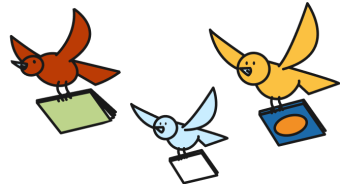
Seasons are celebrated from spring when “Rain beats down,/roots stretch up…” to a cold winter night as “A welcome mat of moonlight/on the floor…” entices a child to snuggle in a warm bed. Accessible, jewel-toned illustrations add setting and movement to a wide range of appealing and very short poems.
Firefly July: A Year of Very Short Poems

Fog is the only type of cloud that is close enough to feel; all other clouds can only be seen. Folk art and crisp text brings different types of clouds into focus for budding scientists. Cloud facts and directions for making a cloud in a jar conclude this informative and engaging introduction to clouds, weather, and observation.
Clouds

While children cavort through a sprinkler on a suburban lawn, animals thrive or survive in other habitats (desert, field, wetland, and seaside). The same sun has a different effect in different places on all living creatures presented in a clear text and handsome, realistic, detailed illustrations.
Beneath the Sun

From sunup to sundown in all types of weather, a small tugboat helps much larger ships into the New York harbor. Realistic illustrations and a crisp text present basic information about the tug and the ships it assists.
Tugboat

Trains carry commuters and cargo; some travel in cities, others go places where there are no roads. Travel on trains through lively language and delicate but detailed illustrations. An author’s note reveals she traveled by train to inform the reader and to let her imagination soar.
Train

Rhythmic language and lively illustration invite readers to join a mother and her child as they travel on the subway. The young girl enjoys the sights and sounds of a diverse city when they travel uptown by going “down, down, down.”
Subway
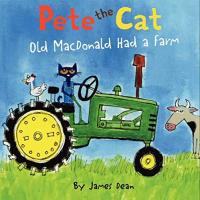
Pokerfaced Pete the cat sings the traditional song with his guitar as he travels the farm in a red pickup truck and his big green tractor. Deadpan illustrations add verve and humor to the familiar tune and farm animal sounds.
Pete the Cat: Old MacDonald Had a Farm

Joe drives his car to his bus where he picks up five dogs and five cats, then drops some off to continue their travel by boat, plane, and train. Boldly colored illustrations and broad shapes much like the author used in My Car (opens in a new window) are sure to appeal.
My Bus
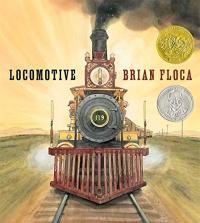
They met in the middle, the workers who built the railway across the United States. The narration speaks directly to readers which follows two unnamed children journey to California. Combined with richly detailed illustration, this dramatic, informative journey is the winner of the 2014 Caldecott Medal. (2014 Caldecott Medal Winner)
Locomotive

Mr. Small enjoys the view from his small aircraft. This is one of Lenski’s now classic “Little” picture books all of which are characterized by simple line illustrations and an unpretentious, straightforward story.
The Little Airplane

Bulldozer was the first to get up when Little Green rolled into town and yelled GO which continued until Little Red came to town and hollered STOP. Red and Green are later joined by Little Yellow’s SLOW DOWN. Vehicles with personality populate this funny, vehicle-filled saga.
Go! Go! Go! Stop!

Frankie is an 18-wheeler with a big personality who shares onomatopoeic sounds he makes and the bright sights he sees as he delivers his cargo. The truck and all he meets along the road are expressively illustrated accompanied by animated language.
Big Rig

There are a surprising number of trucks, introduced from A to Z in a rhyming, informative text. Upper and lower case letters are cleverly used in the simple graphic illustrations, sure to engage readers while introducing a wide range of trucks.
Alphabet Trucks

A golden retriever with a “smart nose” is doing his job: tracking down a young child lost in the woods. The dog’s narration is gentle with the child he’s tracking seen in the dog’s thought bubbles. Additional “dog nose facts” and advice for teachers and parents are presented after the child and parents are reunited.
When You Wander: A Search-and-Rescue Dog Story

When 13 well-known illustrators are asked about their favorite animal, the results are as varied in word and illustration as each artist’s style. Eric Carle introduces a cat called Fifi, while Mo Willems’ is “an Amazonia Neotropical Lower River Tink-Tink.” A clever collection of the exotic and expected is rich and varied; plus it benefits the Eric Carle Museum of Picture Book Art.
What’s Your Favorite Animal?
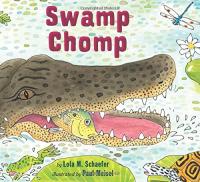
As swamp residents move, water ripples and the creatures munch, gulp, swallow, and more. Short, rhythmic sentences and simple but realistic illustrations present a wetlands food chain. A brief endnote describes the environment and “balance of nature.” The language in this informational picture book reads well aloud, likely to engage listeners.
Swamp Chomp
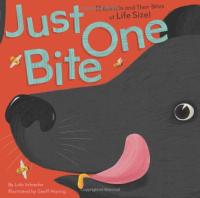
A dot of “dirt (and everything in it)” is a meal for the earthworm seen in a stylized, double page illustration. Four pages open with gatefolds to show the giant squid which is the sperm whale’s feast. Actual sizes of what animals eat are dramatically presented with additional information on the last spread.
Just One Bite: 11 Animals and Their Bites at Life Size!

When Old MacDonald tires of cutting his large suburban lawn, he gets a goat and then a very smart little red hen. When compost and manure are added — and in spite of neighbors’ concerns — MacDonald has a thriving farm to everyone’s delight! This lively, rhyming tale with its exaggerated illustrations just may inspire suburban and perhaps urban gardening.
E-I-E-I-O: How Old MacDonald Got His Farm

The travels of an independent black cat parallel that of a family of four. Both start and end in Rome but intersect as they visit landmarks in other European cities. Lyrical text and delicate, detailed illustrations evoke the wonder of travel. The trip concludes with brief information about the places visited; end pages include a rough map of the travel.
City Cat

The sounds familiar animals make (such as squeak, meow, oink) are each presented in a simple sentence. The letters used in the onomatopoeic sound are embedded in a strong graphic image of the animal. Colors of the image and animal sound correspond, placed on an uncluttered white page. Some jump out, others require careful examination; all are clever.
Cat Says Meow and Other An-i-mal-o-poe-ia

Sharp eyes are needed to see most of the well-camouflaged creatures in the Costa Rican rainforest presented in stunning, realistic illustrations. A simple, repeated sentence lets emerging readers know what (e.g., bird, snake) to look for in each double page spread. The animals are specifically identified on the final page.
Can You See Me?

As a young, sickly child, “Teedie” Roosevelt dreamed of becoming an adventurer like in the books he gobbled up. Lush, expressive illustrations, well-chosen quotes, and a lucid text brings the life of the boy who grew into a remarkable man whose biggest adventure may have been that of the 26th President of the United States.
To Dare Mighty Things

This lively look at Thomas Jefferson’s lifelong obsession with books and reading is told with verve and humor. How Jefferson’s sizeable book collection came to reside at the Library of Congress brings both the man and his time into focus. Additional information about the man and his legacy as well as additional resources conclude this brief, fact-filled, engaging book.
Thomas Jefferson Builds a Library

Sophisticated readers will appreciate the snippets of presidential history presented in a variety of poetic forms. Illustrations, reminiscent of political cartoons, range in tone from serious to silly. Additional information about the office and the individual presidents concludes this appealing and surprisingly informative collection (which includes the sitting POTUS).
